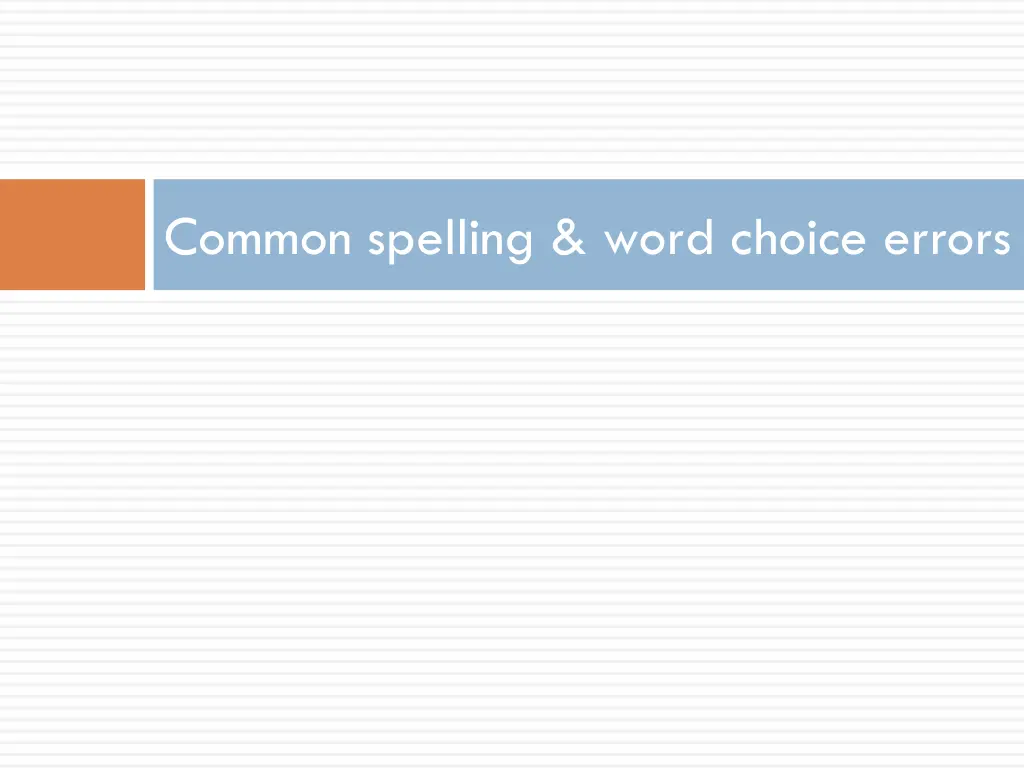
Avoid Common Spelling and Word Choice Errors
Enhance your language skills by recognizing and correcting common spelling and word choice errors such as its/it's, your/you're, and their/there/they're. Learn about homophones, homophones with contractions, and common word choice mistakes. Improve your writing with practical tips and strategies to avoid these errors.
Download Presentation

Please find below an Image/Link to download the presentation.
The content on the website is provided AS IS for your information and personal use only. It may not be sold, licensed, or shared on other websites without obtaining consent from the author. If you encounter any issues during the download, it is possible that the publisher has removed the file from their server.
You are allowed to download the files provided on this website for personal or commercial use, subject to the condition that they are used lawfully. All files are the property of their respective owners.
The content on the website is provided AS IS for your information and personal use only. It may not be sold, licensed, or shared on other websites without obtaining consent from the author.
E N D
Presentation Transcript
Common spelling errors its/it s your/you re their/there/they re two/too/to aid/aide What is similar about these pairs? What is similar about these pairs?
Homophone? A word that is pronounced like another word but is different in meaning, origin, or spelling. Ex.: moose, mousse Source: Merriam-Webster's Learner's Dictionary, n.d.
Example of homophone mousse moose
Homophones with contractions its/it s your/you re their/there/they re Question: How do we indicate contractions?
Other errors lose/loose chose/choose two/too/to aide/aid there/their than/then
Compare with known word: moose olose/ lose/loose: Loose (not tight enough) Lose (didn t win or misplace) loose:
Other Strategies? chose/choose; two/too/to; aide/aid; there/their; than/then Make a list of your common errors and keep it handy. Use spell/grammar check Use a program, like grammarly to check
Common word choice errors who/that he/she vs. they which/that
Who vs. That Common usage: Who and that are interchangeable APA rule: Use who for human beings; use that or which for nonhuman animals or for things (APA, 2010, p. 79).
Who vs. that Teachers who are invested in student learning One book that you need for graduate school is the APA manual.
The problem of the missing gender- neutral third person pronoun He She It ?
Common (incorrect) usage: We observed the first teacher three times. During the observations, they... Their classroom... What should we do if we don t know the teacher s gender? We observed the first teacher three times. During the observations,...
Which vs. That Which and that are often used interchangeably and which is often over- used. That is the defining, or restrictive, pronoun, which the nondefining, or nonrestrictive (Strunk & White, 2000, p. 59). The lawn mower that is broken is in the garage. (Tells which one.) The lawn mower, which is broken, is in the garage (adds a fact about the only mower in question.)
Restrictive Elements According to Grammar Girl (2010) when a restrictive element is left out, it changes the meaning of the sentence. Restrictive elements are not surrounded by commas. Grammar girl provides this example: Dogs that howl make me crazy. http://grammar.quickanddirtytips.com
Nonrestrictive Elements According to Grammar Girl (2009) nonrestrictive elements [which] are surrounded by commas , providing this example: Dogs, which make great companions, are usually furry.
A quick and dirty tip from Grammar Girl If you think of the Wicked Witch (Which) of the West from The Wizard of Oz, you know it s okay to throw her out. You won t change the meaning of the sentence without the which phrase. So, you can throw out the which (or witch) clause, commas and all. From: http://grammar.quickanddirtytips.com
Ask yourself: Does the additional information help define what I am talking about? Is it necessary? If the answer is yes, use that for objects or who for people (e.g. The student on the end who is giggling ). Ex.: The lawn mower that is broken is in the garage.
Practice makes perfect! With a little help from my friends
